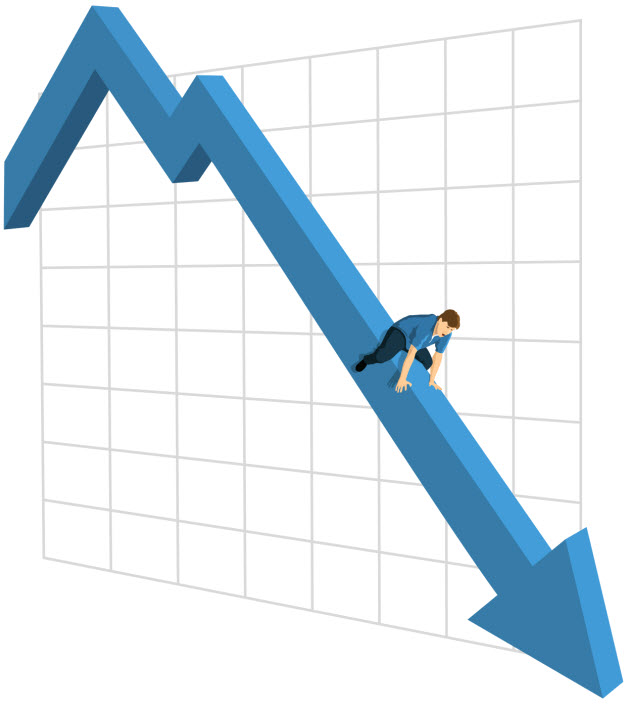Spain was down again before we noticed it was up. Yesterday morning, stocks all over the world were rising on hopes of a solution to the euro problem. By afternoon, the rally was over. The Dow ended the day down 142 points.
But that’s the way the euro rescues go. The effects are more and more short-lived. Pretty soon, investors will realize they don’t work at all…and then there won’t be any up-surge, A new rescue plan will be announced. Investors will realize it is just another scammy fix. And stocks will go down.
When that happens the game will be over.
We might not be far from that point now.
Meanwhile, the US is worried too. About Europe, which is on the verge of total breakdown? Maybe. About China, which is growing at its slowest pace in 13 years? Maybe.
About the US itself…where the ‘recovery’ went missing? Almost certainly.
Here at our Daily Reckoning headquarters, we remain sans soucis. Which is another way of saying, we’re enjoying the show. What will the fixers do next, we wonder? Every fix makes things worse. But they keep at it.
For the benefit of Dear Readers with skin in the game, we leave our “Crash Alert” flag up for a few more days. This market could go to hell in a hurry. If you’ve got skin in the game, get it out.
And, for the benefit of everyone, we cast our weary eyes down to the pampas. Is there any policy so foolish the Argentines have not had a go at it? Is there any financial disaster so catastrophic the gauchos haven’t repeated it at least two or three times? Is there any trick so dishonest or so transparently fraudulent that the politicians south of the Rio de la Plata don’t make a regular habit of it?
Our Bonner Family Office chief investment strategist, Rob Marstrand, who makes his home in Buenos Aires, is visiting us in the US this week. He tells us that it is said to be a crime in Argentina to mention the “parallel” market in dollars. On the official market, the peso still trades at about 4.4 to the dollar. On the unofficial exchanges, that is, on the parallel market, the “blue” peso trades at less than 5.1 to the greenback.
But it’s apparently illegal to mention it.
So is it supposedly illegal to publish the real inflation rate. The Argentine feds have their rate; it’s a crime to contradict them.
The government is also trying to get Argentines to stop using the dollar as a protection against peso inflation. The president says she is converting her own dollar deposits to pesos, to set an example.
“I guarantee you she is not converting her accounts in Switzerland,” says Rob.
But the typical Argentine wasn’t born yesterday. He’s been around the block a few times. He knows that when the government gets in financial trouble, it can’t be trusted. He knows that it will seize whatever money it can get its hands on — especially if it is foreign currency. So, if he’s saved dollars, he’s hiding them…or getting them out of the country. Here’s the Reuters report:
BUENOS AIRES, June 8 (Reuters) — Argentine banks have seen a third of their US dollar deposits withdrawn since November as savers chase greenbacks in response to stiffening foreign exchange restrictions, local banking sources said on Friday.
Depositors withdrew a total of about $100 million per day over the last month in a safe-haven bid fueled by uncertainty over policies that might be adopted as pressure grows to keep US currency in the country.
The chase for dollars is motivated by fear that the government may further toughen its clamp down on access to the US currency as high inflation and lack of faith in government policy erode the local peso.
From May 11 until Friday, data compiled by Reuters from private banks showed $1.9 billion in US currency had been withdrawn, or about 15 percent of all greenbacks deposited in the country.
Feisty populist leader Fernandez was re-elected in October vowing to “deepen the model” of the interventionist policies associated with her predecessor, Nestor Kirchner, who is also her late husband.
She wants Argentines to end their love affair with the greenback and start saving in pesos despite inflation clocked by private economists at about 25 percent per year.
Fernandez set an example on Wednesday by vowing to swap her only dollar-denominated savings account for a fixed-term deposit in pesos.
But savers in crisis-prone Argentina are notoriously jittery.
Why would they be jittery? Because their dollar deposits were seized and forcibly converted to pesos 10 years ago? Because the peso was devalued by 66% in the last crisis?
Or because the Argentine peso of 50 years ago has been devalued by approximately 42 trillion percent. We don’t know how such a thing is mathematically possible…but that’s the report we’ve read.
Defaults, devaluations, hyperinflations — the Argentines have seen it all.
Americans have a lot to learn.
And another thought…
The British writer AA Gill once noted that…
“Europe is an allegory for the ages of man. You are born Italian, relentlessly infantile and mother-obsessed. In childhood, you are English: chronically shy, tongue-tied clicky and only happy kicking balls or pulling the legs off things. Teenagers are French: pretentiously philosophical, embarrassingly vain, ridiculously romantic yet simultaneously insecure. During Middle-Age, we become either Irish and fun loving, or Swiss and serious. Old age is German: ponderous, pompous and pedantic. And finally, we regress into being Belgian, with no idea of who we are at all.”
Bill Bonner
for The Daily Reckoning

Since founding Agora Inc. in 1979, Bill Bonner has found success and garnered camaraderie in numerous communities and industries. A man of many talents, his entrepreneurial savvy, unique writings, philanthropic undertakings, and preservationist activities have all been recognized and awarded by some of America’s most respected authorities. Along with Addison Wiggin, his friend and colleague, Bill has written two New York Times best-selling books, Financial Reckoning Day and Empire of Debt. Both works have been critically acclaimed internationally. With political journalist Lila Rajiva, he wrote his third New York Times best-selling book, Mobs, Messiahs and Markets, which offers concrete advice on how to avoid the public spectacle of modern finance. Since 1999, Bill has been a daily contributor and the driving force behind The Daily Reckoning. Dice Have No Memory: Big Bets & Bad Economics from Paris to the Pampas, the newest book from Bill Bonner, is the definitive compendium of Bill’s daily reckonings from more than a decade: 1999-2010.
Special Report: Wait until you see what could happen in America next… An unbelievable phenomenon is set to sweep the nation… The railroad, steel, and technology age – this phenomenon triggered them all. And now it’s taking shape again! Watch this special, time-sensitive presentation now for full details on how it could affect your job… your lifestyle… and your wallet. Here’s How…
Read more: Learning from the Best: Inflation Lessons from Argentina http://dailyreckoning.com/learning-from-the-best-inflation-lessons-from-argentina/#ixzz1xgGs861q


















